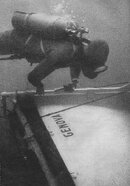So have you gone Tech - deco, caves, wreck, and deep? Or is there plenty keeping you occupied in the first 130' of water?
yes, yes, yes and yes. Who says you can't do deco in under 130 :-D? I've done the majority of my deco dives above 130. Tongue in cheek obviously
I got into caves because while in college and grad school it was cheaper than wreck diving and most of my buddies did it. I love it and while I will still choose wreck over cave, I will never turn down the opportunity to slither thru a rock tunnel.
Got into wreck diving because that's about all there is in NC, and plenty of the good ones are sub 130, but without doing any decompression, that's not a whole lot of time, so deco is obligatory for me. It's worth sitting on a hang line to have the extra time to actually see and do stuff.
As far as real deep stuff, I'll do it, but it's not worth all the extra money in fills to me. certainly not yet. may change one day, but who knows. Breather will happen eventually once.
That all being said, I don't consider myself a tech diver. I consider myself a diver. Where I work, we don't distinguish between the two. Our OW students look the same in the water on their second day of OWT that most tech divers do after fundies or whatever. They are allowed to dive doubles any time after they receive their OW certs and it has never been a big issue for them other than getting used to the extra weight on land. I'd feel more comfortable cave diving with some of our students just out of OW than I would with the people that I see in the caves with formal cave training. My bosses don't certify them unless they feel comfortable that their skills are on par. We have that luxury at a university that no dive shop could ever come close to. So while I may look like a tech/cave diver, most of my diving is purely recreational because I do it for my "personal leisure and enjoyment" so say the wikipedia article on recreational diving. NOAA claims that tech diving is any diving that takes the diver beyond the recreational depth and time limits, and by that definition not a whole lot of my dives are technical. A fair amount are, but a lot of them aren't. Some also say any solo diving is "technical" in which case almost all of my dives are because I rarely consider myself truly buddy diving. I treat every dive as a solo dive regardless, but will be aware of my buddy. This stems from seeing too many near accidents with buddies not paying attention and I'd rather trust myself to save my own butt than rely on anyone. Neither here nor there. Point is you have to decide what the definition of "Tech" is and what type of diver you consider yourself.
Cards were mentioned, I have my Nitrox diver card, rescue diver card, and technical cave cards. That's it... The cave card only comes out when I need it, other than that they see the nitrox card. I'm not one for "formal" training and hate the concept of C-cards. My boss is a firm believe that the progression should be, diver, cave diver, and instructor. He's old school, and well old, but I don't need classes and cards to prove that I can dive, nor does anyone else and frankly, most of the people I've seen with extend-o-wallets full of C-cards are downright terrifying in the water. We push our students and make them do stuff unheard of in any other open water class by the agencies, but the mentality of the tech divers was mentioned earlier, and unless our students have that mentality, they won't get their basic card. Again, advantage of a university where we can certify one person out of 3 classes of 16 each and there is no harm to the salaries. Cool thread though overall, some interesting experience mainly from the old guys that were around before all the certifying nonsense
Just saw that gear was mentioned. I can baretank breathe quite comfortably so in a pinch I could easily do a "technical" dive with no regulators, no bc's etc. It would certainly not be ideal, but it would be possible. Awesome mention of the Doria dives. Poor buggers must have been narc'd out of their mind without helium, but shows what you can do with minimal gear they had




